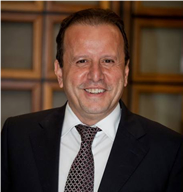ICO’ executive director Roberio Oliveira Silva delivered a keynote on the occasion of the Opening Ceremony of the 50th anniversary meetings of the International Coffee Organization, which took place on Monday 9 September 2013 in Belo Horizonte, Brazil.
The following is the full text of the speech.
First of all, I would like to convey my warmest appreciation and gratitude to the Government of Brazil and the Government of the State of Minas Gerais for having honoured the International Coffee Organization by welcoming the world coffee community to commemorate the Organization’s fiftieth anniversary in Belo Horizonte.

In this happy occasion, I want to commend the work of an institution that remains fully committed to achieving a more balanced international coffee market, anchored on the tenet of international cooperation, and aimed towards securing greater market transparency and stable and remunerative prices across the entire coffee supply chain.
Although the socio‐political environment that gave birth to the Organization has changed dramatically, moving away from a post‐war consensus that made possible the successful provision of economic clauses in the International Coffee Agreement to a slightly more chaotic multipolar world in terms of competing agendas and centres of power, the need for dialogue remains more crucial than ever.
The issues faced by the global coffee industry are too crucial to be left un‐tackled, hoping that the market alone will be able to solve the dilemmas of scarce resource allocation, rural poverty alleviation, the fight against environmental degradation, the preservation of diverse origins, and many other pressing questions that must be accounted for when looking at the future of our industry.
The old consensus found a way of reducing poverty and bringing order to a volatile market, a not negligible contribution towards a safer, more peaceful world.
Today we face equally daunting challenges that must be addressed, albeit firmly rooted in the economic, social and politic realities of our times. We do not look back to our past with nostalgia for a by-gone era of export quotas and hard-wired market intervention, but rather as a source of inspiration in the belief that human agency can be harnessed to bring about meaningful solutions in our present times.
Even though the coffee industry as a whole managed to navigate rather successfully the financial crisis of 2008, the current steep fall in prices risks once again creating the conditions of a coffee crisis not unlike the one seen at the turn of the century.
It is in this light that the coffee sector has come to realise that the ICO is well placed to undertake multiple forms of international cooperation which could be beneficial to the sector and produce positive economic results.
This perception is reflected in the changes in the Objectives of the Agreement from the 1994 Agreement to the current 2007 Agreement.
It has led to very different terms of reference for the second half of the life of the ICO, from 1990 to date.
Today, the ICO has adopted a Strategic Action Plan based on four strategic goals: Serving as a forum for the development of policies and solutions to strengthen the global coffee sector; enhancing transparency of the coffee market; encouraging the dissemination of knowledge; and promoting the development of a sustainable global coffee sector.
The organization is working hard to streamline its operations and comply with the requirements of the information age we live in. I can confidently say that it is about to embark in the most ambitious reform plan it has seen over the 50 years that have elapsed since its creation, always with the explicit aim of better serving the requirements of its Members and those of the larger global coffee community.
The challenges that the ICO will face in both the short and long term are directly derived from the main issues facing the coffee industry globally. Those issues are the priority areas that the ICO is gearing up to tackle with renewed vigour. They can be broadly split into three categories: economic, environmental and social.
Economic: Issues such as price volatility and economic uncertainty have been of long‐standing concern, but remain a crucial aspect of the ICO work plan. Focusing on risk management and economic sustainability will remain be at the forefront of the ICO’s activities.










